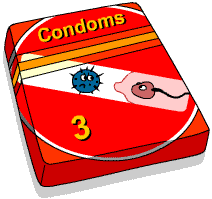Condom Conundrum Divides The Church
Created | Updated Jul 11, 2003

In a clash of moral values, the churches usually assume they hold the high moral ground.
However, when Catholic bishops in southern Africa last month declared the use of condoms to prevent the spread of Aids to be 'immoral and misguided', they found themselves accused of being irresponsible and misguided. That must cut deep. One thing bishops pride themselves on is being responsible; and the guidance they lay claim to, being from God as they firmly believe, is second to none. Could they be wrong?
Yes, they could - and many Catholics, among others, think that in this decision, they were. The bishops could say they were merely being consistent with centuries of teaching about the natural law in general, and with Pope Paul VI's 1968 encyclical banning artificial contraception in particular. The problem is that those approaches are human and imperfect, notwithstanding the church's claim to speak with divine authority, and need always to be tested by their adequacy in specific situations, and by love.
The specific situation is that 70 per cent of about 34 million people worldwide who carry the HIV/Aids virus live in southern Africa, and 13 million of the 16 million who have died of Aids died there. In South Africa, up to five million people, or more than one in 10, carry the virus.
Love requires a compassionate response. The government's strategy is to promote the use of condoms to prevent infection, though they are not foolproof, on the basis that they will protect at least 85 per cent of users from the disease.
The bishops counter that condoms encourage promiscuity and therefore increase the incidence of Aids. Human dignity is at issue, they say, so the truly compassionate response is for the church to promote abstinence from sex before marriage and faithfulness within it.
Obviously, no one is going to get into trouble by following those precepts. But they pose two problems. In the realities of southern Africa and elsewhere, moral messages, however high-minded, are not going to curb the Aids epidemic. Sex is so basic and powerful an instinct that there will be many people of all ages who find themselves carried away - or taken advantage of - outside marriage or steady relationships. Aware of that, it was Catholics closest to the Aids sufferers who sought a change in the church's stance. Bishop Kevin Dowling of Rustenburg, for example, argued that the church could approve condoms for 'preventing the transmission of death, and therefore not as a contraceptive
to prevent the transmission of life'. The church newspaper Southern Cross endorsed this view, drawing a parallel with medication to regulate a woman's menstrual cycle, which the church allows even though it also makes her temporarily infertile.
Ironically, the bishops tacitly reflect this position when they say married couples may use condoms when one of them is HIV-positive, as long as they abstain while the woman is ovulating. In this way, there would be no artificial barrier to conception (which was the point of the papal encyclical). The bishops also say that prophylactics 'change the act of love into a selfish search for pleasure', as if pleasure somehow detracts from human dignity and responsibility. On the contrary, the pleasure of making love while preventing conception can be a way to express love and responsibility for each other - which is why millions of Catholics in committed relationships use contraceptives despite the church's condemnation.
That raises the second, and deeper, problem. Those couples are not rejecting morality, but asserting an alternative morality which seems to them more human, more loving and more Christian. No one should say they are being irresponsible.
The pope's 1968 encyclical probably did more to erode the church's moral authority than anything else the church has done in the past century. Catholics listened, and made up their own minds.
So with this statement. Its strict imposition would condemn millions to suffer and die needlessly. Quietly or stridently, many Catholics will dissociate themselves from it, and non-Catholics will reject it. One of these is Cape Town's Anglican Archbishop Njongonkulu Ndungane who says: 'This is a crisis and we can't pretend things are not happening. We advocate abstinence and faithfulness to partners, but we have 'to provide protection for those who cannot abstain.'
For the most vulnerable, which is the more Christ-like response?
